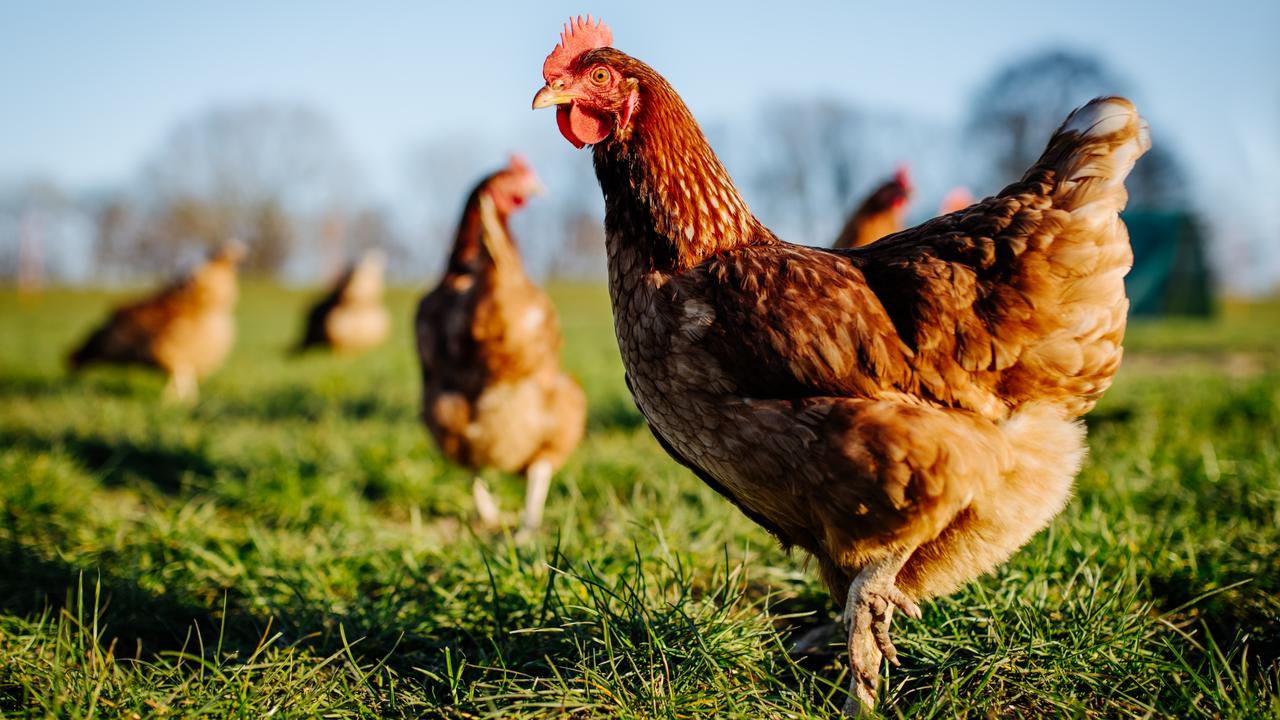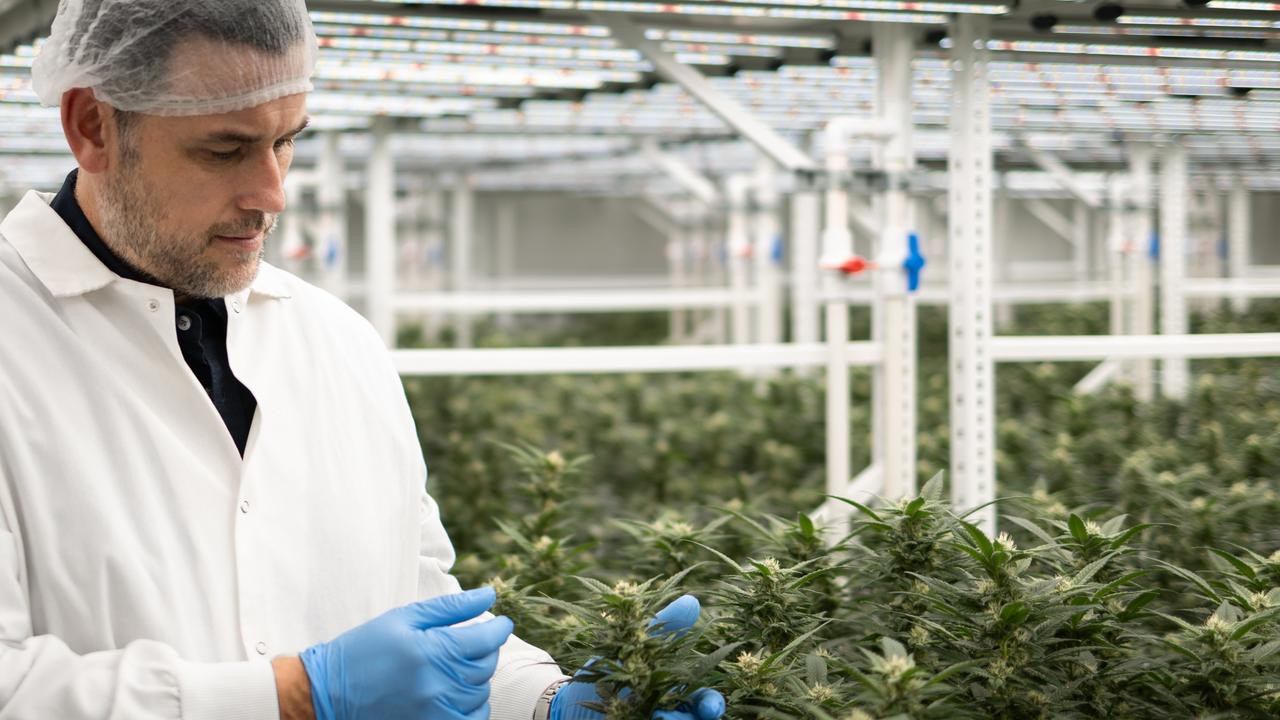Labor’s 10 years of power: Crime rate has fallen but Victorians aren’t feeling safe in their own neighbourhoods
The crime rate has not changed one iota in the past decade — but with youth gangs, the raging tobacco war, relaxed bail laws and police pay disputes, Victorians do not feel safe.
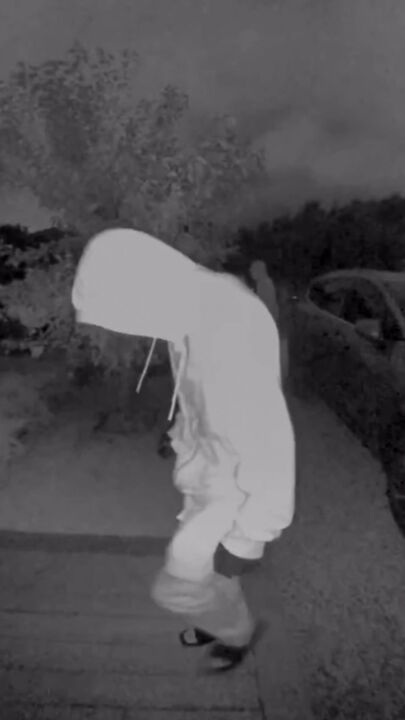
Victoria
Don't miss out on the headlines from Victoria. Followed categories will be added to My News.
- Kennett: Being soft on crime doesn’t make us safer
- Bracks: Labor’s record investment to keep Victoria safe
The number of crimes happening in Victoria – once you’ve taken population growth into consideration – has not changed one iota in the past decade.
But Victorians don’t feel safe.
Asked this year whether they felt secure walking alone in their neighbourhood at night, more people than not (47 per cent) said they didn’t. This is compared to almost 60 per cent when Labor came to power in 2014.
Although a 2012 Liberal concept, Labor boosted Protective Services Officers at railway stations to more than 1400 today.
But those who feel safe travelling alone on public transport at night is just a lowly 33 per cent.
Trust and contentment in Victoria Police has also fallen off a cliff.
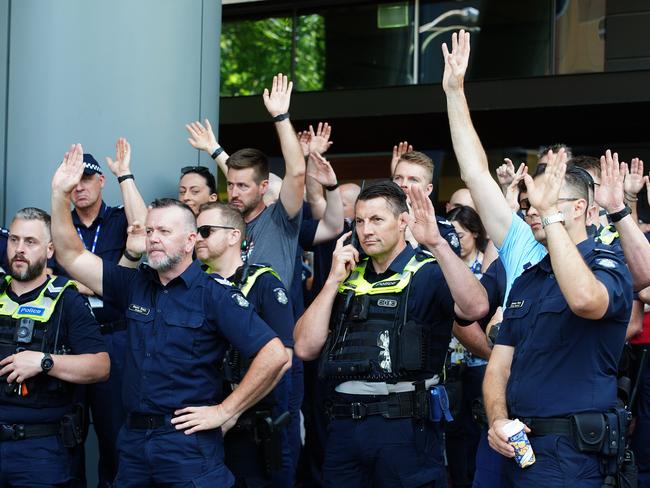
The proportion of the community satisfied with policing services this year is 55 per cent — the force had a target of 80 per cent. In 2014, 78 per cent of those asked said they were satisfied.
Those who thought Victoria Police had integrity was 62 per cent. That’s a sharp decline from 89 per cent who thought the same in 2014 and a far cry from the 82 per cent target it has today.
But the number of crimes isn’t going up, so what’s going on?
Youth gangs
Young groups causing havoc burst onto the scene under Labor at the March 2016 Moomba riots. It was the most public display of disorder since the G20 riots a decade earlier. The groups — armed with mobile phones — wanted to cause chaos, film it, and upload the footage to social media.
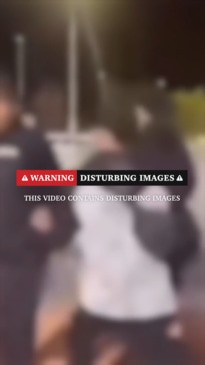
Many involved were later linked to the Apex gang — named after a Dandenong North street — and formed by two South Sudanese brothers. Carnage followed at the 2017 and 2018 Moomba “family-friendly” festivals.
While Apex has long gone, Chief Commissioner Shane Patton says youth crime is now the force’s single biggest priority. It has more than 70 detectives, more than any other unit — under Operation Trinity — investigating these groups.
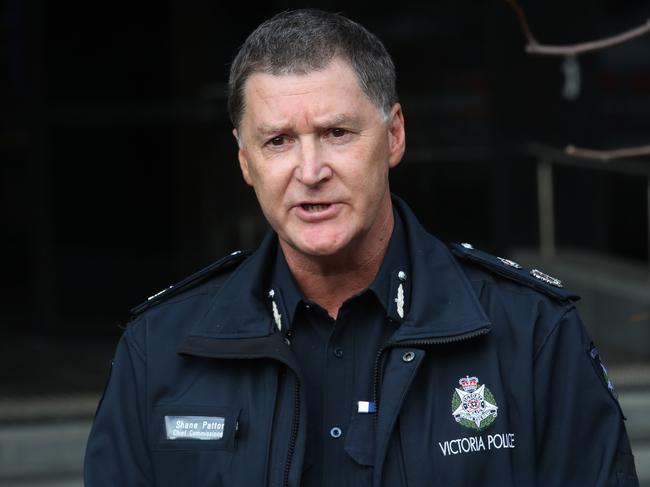
They have thrown the kitchen sink at youth gangs but they are more active than ever. Labor has responded by raising the age of criminality from 10 years old, first to 12 and then 14 by 2027.
Last year, 14-17 year olds were linked to almost 19,000 crimes, a 30 per cent rise in the year before. The issue for police is these gangs are not committing crimes for greed or profit.
They are a post and boast generation seeking ‘fame’ through clicks and likes. It is deeply troubling for police when the first interaction they have with a child is for an aggravated burglary, stealing a car and driving it at 200km/h just to upload it on social media.
The crimes and how brazen they are about it frighten the community and raising the age of criminality isn’t going to fix that.
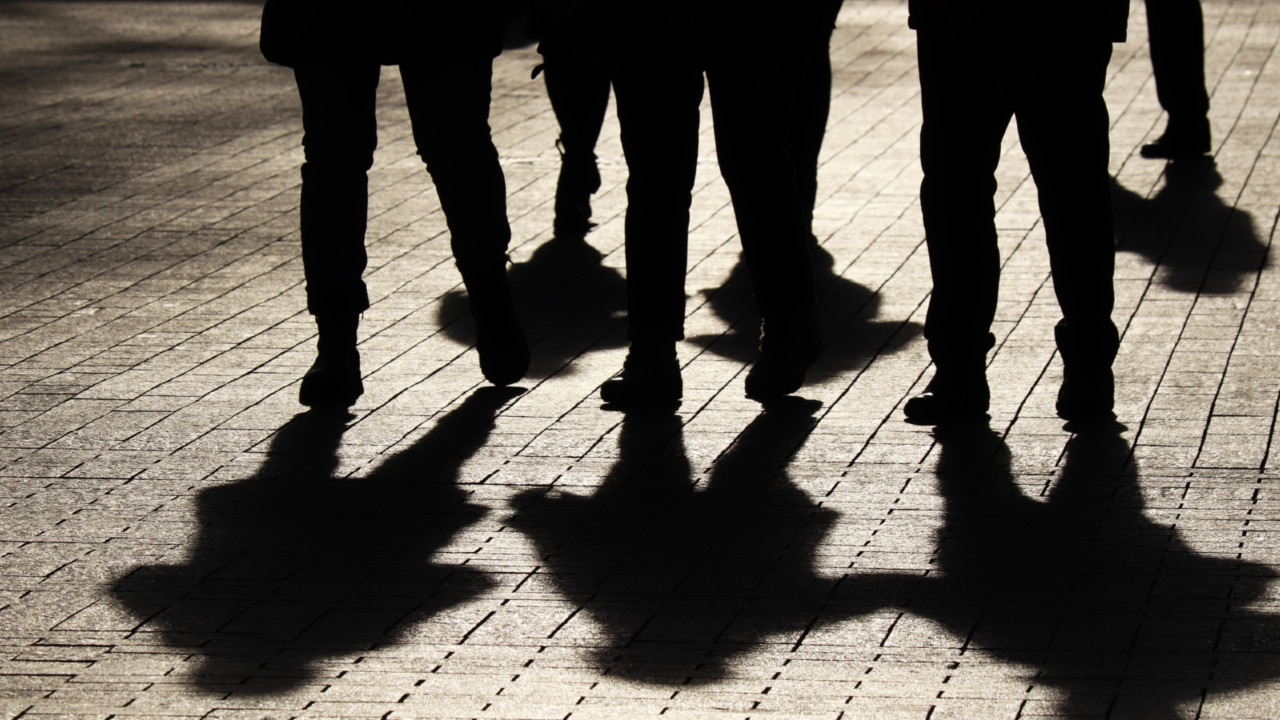
Tobacco wars
Labor knew tobacco licencing was an issue years ago. Victoria was the only state or territory — and still is — not to have any scheme in place. Here, it is perfectly fine for a 13-year-old to be selling tobacco to an adult and there is no fit and proper person test.
In 2021, the now Deputy Premier, Danny Pearson, wrote to Better Regulation Victoria asking what should be done.
It responded a few months later saying laws needed toughening up and a licensing scheme should be implemented.
Labor sat on its hands while serious organised criminals got to work. Victoria is now the “epicentre” of a raging tobacco turf war and it is only by sheer luck no innocent person has been killed in the crossfire. It’s come close.
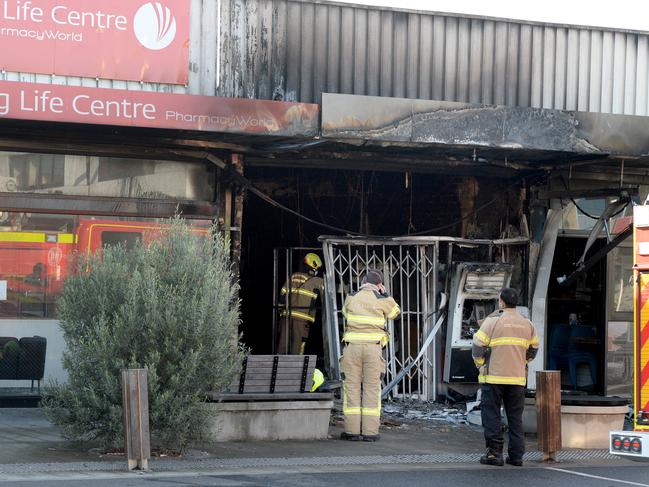
Would the licensing scheme have solved our problems — probably not. But it would have given police a running start.
Much of the investigation into more than 115 firebombings across the state since March last year has been working out who is selling illicit tobacco. Some of it is obvious but illicit tobacco is now sold out of butchers and well, who the hell knows.
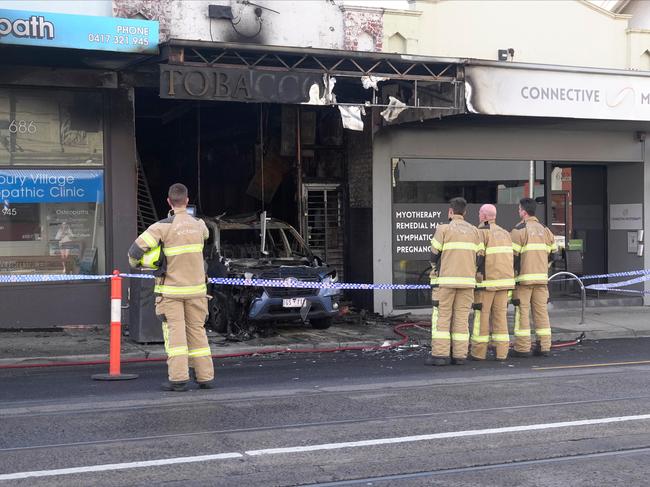
Due to a lack of regulation, during Covid shops selling tobacco put a bar fridge in the corner with an out of date bottle of milk and said they were a convenience store while Jim’s Mowing had to close down.
The attacks on businesses are happening all over Victoria and regularly. But when police do make an arrest and charge people, some allegedly at the upper echelons of these gangs, the courts let them walk free.
New legislation, with nation-leading punishments, was announced this month and is welcomed – but why the wait? Experts predict we won’t see boots on the ground until 2026 so the tobacco wars are here to stay in Victoria for some time yet.
Bikies
Why do bikies from all over Australia carry out their muscle-flexing grandstanding national “bikie runs” here in Victoria?
It’s because we have the most relaxed laws in Australia.
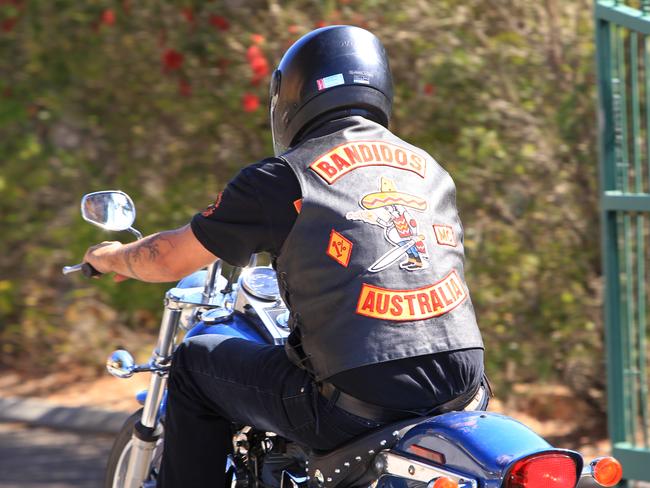
We do have anti-association laws, but they haven’t been used one since their introduction in 2016. Police say they are unusable and instead rely on Firearm Prohibition Orders, which allow officers to search a person, their vehicle, home or business without a warrant.
But anti-association laws are operational and have been used on hundreds of people in New South Wales and Queensland, ironically even on Victorians such as Toby Mitchell.
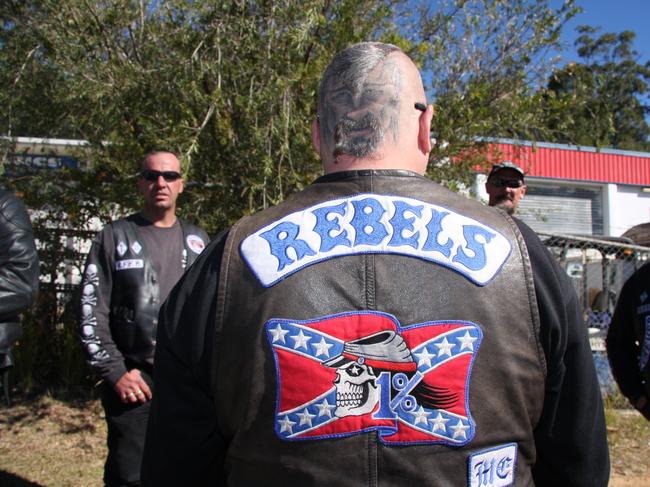
In Victoria you can wear your club colours, fraternise with whoever you want, even go to the tennis — it’s against the Victorian Human Rights charter if you can’t.
Laws in New South Wales and Queensland — where it is a crime to wear your club colours — have made it tough for bikies to operate, so much so that many have relocated here.
Labor should be making Victoria as equally uninviting.
Shane Patton
He got the top job four and a half years go promising a return to community policing — then Covid hit. He wanted Victorians to see officers when they went to their local shops, to see police driving down your street.
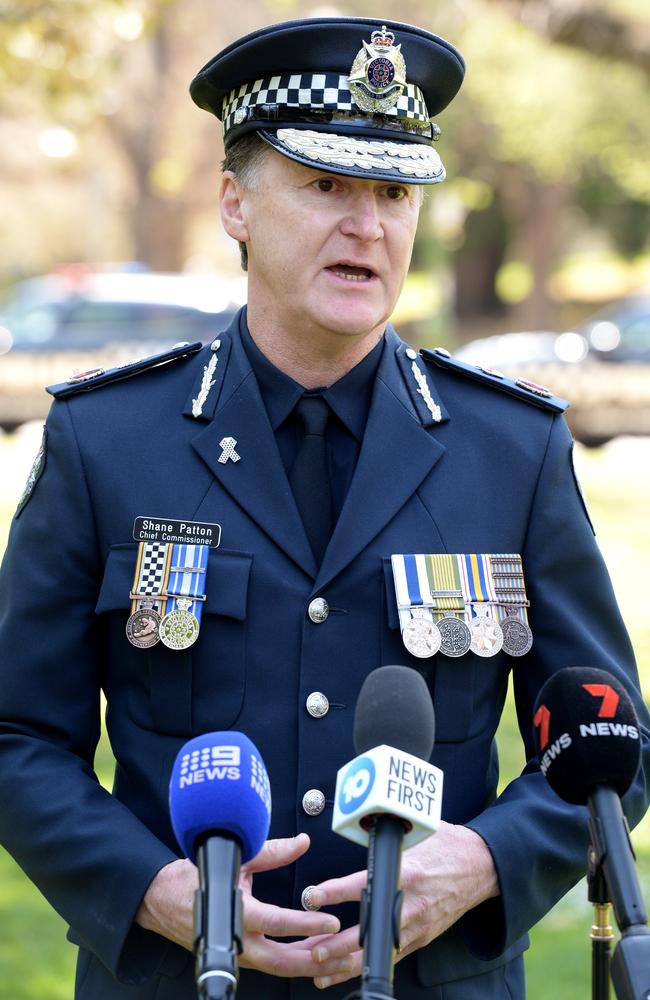
Labor has made a record investment in police with an unprecedented workforce of more than 22,000, but none of Mr Patton’s vision happened.
Instead officers were forced to make sure grannies were not sitting on park benches, parents were not sipping a flat white at the playground and children were not turning up to skate parks to kill some time during the world’s longest lockdowns.
Community policing would be rejoiced by Victorians, who would like to see officers not just when they’ve been the victim of a car jacking or some other shocking crime.
Protests
Every Sunday, without fail, anti-Israel protesters parade down our city streets with some sporting terrorist symbols and waving Hezbollah flags
Despite calls from Victoria Police and the Police Association, Premier Jacinta Allan has rejected the idea of protest permits being introduced in the state, like they are in New South Wales.
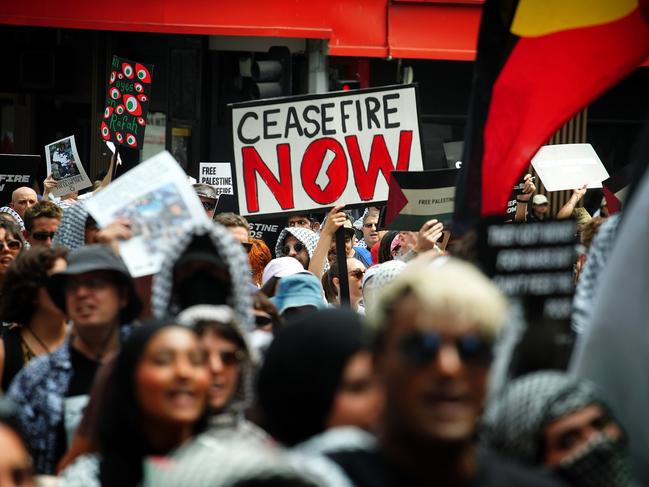
The anti-Israel and other protests require significant resources from Victoria Police and take officers away from protecting our community.
Without a permit system, police must rely on intelligence alone to know when a demonstration is taking place, where it will happen and how big it will be and the impact on the rest of the community.
Even the unveiling of the iconic Myer Christmas windows — an event for young children — was targeted.
There were also ugly scenes at this year’s Land Forces expo.
It was Victoria Police’s largest operation this millennium and the state government had to pay the force $15m to protect those attending.
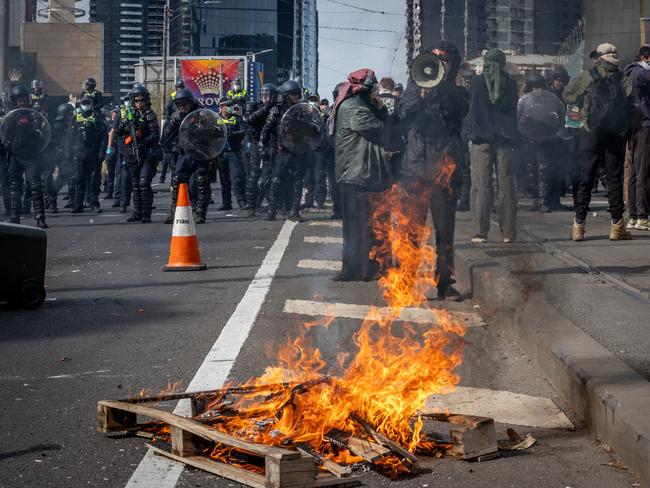
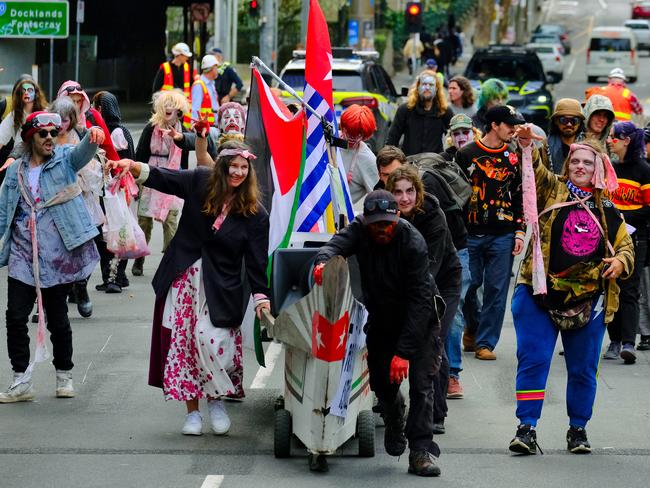
Police horses were punched, officers were spat at and had acid and urine thrown at them, businesses were trashed and nearby workers told to stay home.
So it was surprising to learn the state government fought to bring the conference here, after Queensland said it would not host the controversial event.
Worse still, treasurer Tim Pallas has not ruled it out coming back next year. Are we that desperate for a dollar?
Recruitment
Every police force in the country is struggling to attract new recruits, but Victoria Police seems to be doing it tougher than anywhere else.
Huge numbers left the organisation after Covid and there are currently 900 vacancies and a further 800 officers off sick.
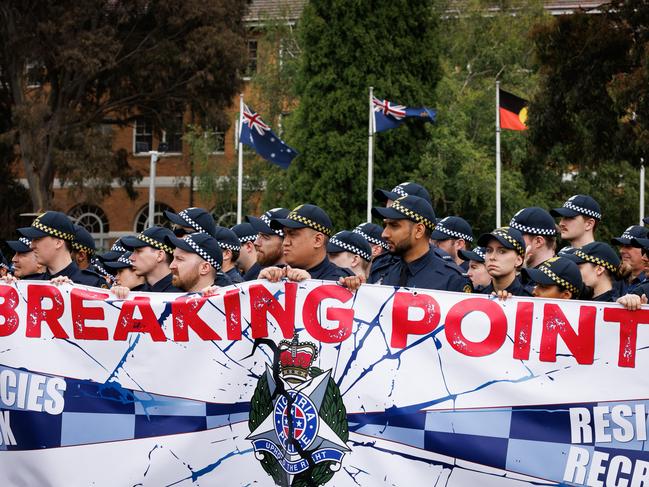
Many left for forces in Queensland and New South Wales, disillusioned with what they were asked to police here in Victoria during the world’s longest lockdown.
Apparently they didn’t join the force to make sure you were not straying more than 5km from home.
The organisation has lost a lot of experience, including at higher ranks, and now it is struggling to attract new recruits.
When you see vision of officers having bottles and horse manure thrown at them, it’s not a great advert. Not when you can work in a factory for the same pay.
Pay deal
Pay negotiations are dividing the force and it has been a mess from start to finish resulting in officers walking off the job for the first time in 20 years.
The Police Association went hard for nine-hour shifts over a nine-day working fortnight. Chief Commissioner Shane Patton said this would stretch resources and risk community safety as well as cost more than $3bn.
“We simply can’t afford it,” he said last November.
The next month, he agreed with the state government to look into developing and implementing such a model.
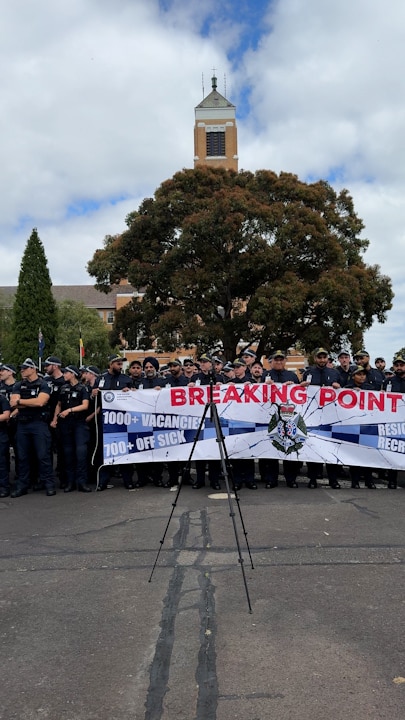
But officers voted that — and a 16 per cent wage rise — down.
They didn’t want it. They wanted the cash.
The Association is now asking for a 24 per cent pay rise over four years.
The state government has a public sector wage cap of three per cent per year but the Association accused Victoria Police of walking away from the bargaining table.
Vans are currently daubed in slogans like “Our chief, the wage thief” and “End the Patton of wage theft.”
The state government hasn’t got involved, like it did for other sectors like nurses.
The issue now sits with the Fair Work Commission and there is a real fear it could rule on a pay rise less than the 16 per cent offer officers rejected in July.
Courts and bail laws
In 2018, Labor was applauded for toughening up bail laws that saw James Gargasoulas free to mow down pedestrians in Bourke Street the year before.
But in 2023 it walked back those laws, making it easier for low-level offenders to stay out of prison and remand banned for offences where a sentence of imprisonment would be unlikely.
Offences of “breaching bail conditions” and “committing further offences while on bail” – introduced by the Liberals in 2013 – have also been repealed.
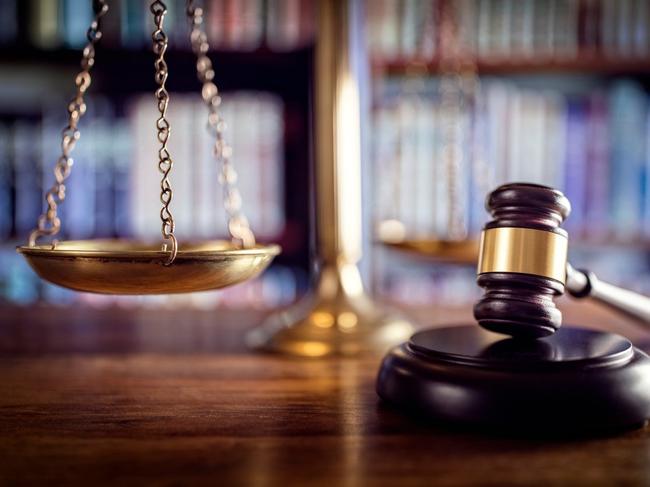
The Herald Sun revealed this month how one of the state’s most prolific youth offenders has been given bail 50 times.
It simply doesn’t pass the pub test.
But the court system as a whole seems to be hanging by a thread.
Victoria has the worst Magistrates’ Court wait times of more than 12-months than any other mainland state.
Magistrates’ Court civil case wait times of more than 12-months is the worst of any state.
County Court criminal wait times of more than 12-months is the second worst of any state.
Supreme Court criminal case wait times of more than 12-months is the worst of any mainland state.
The cost of Supreme Court criminal and civil cases is the highest in the country.
And if you do get sent to prison for killing a mother in front of her four year old over $50 like Alicia Schiller, at least you know you’ll be allowed out for IVF treatment, so you too can become a mother.
You couldn’t make it up.

